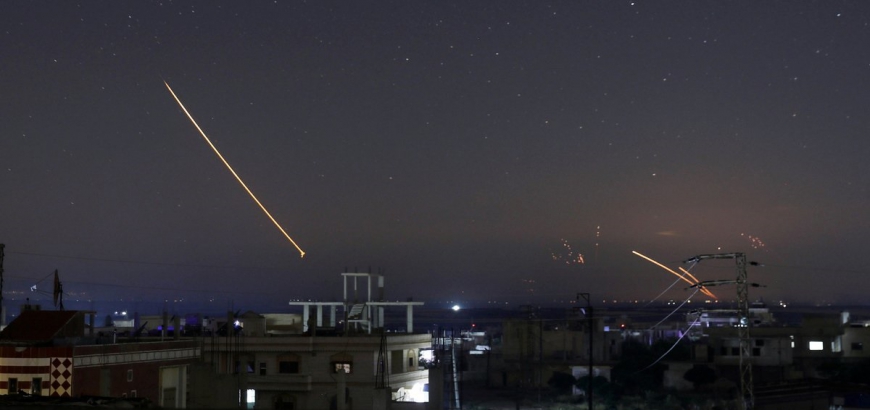The date of Thursday May 10, 2018 represented a pivotal shift in the Iranian-Israeli confrontation as the two sides entered into the most dangerous military escalation between them so far, with Syrian territory as its stage, a matter which threatens more developments with dangerous consequences in the Middle East.
Israel summed up the extent of its strikes on Iranian targets by describing them as airstrikes it carried out on 10 military positions in Syria, saying they were “one of the major military operations carried out by the Israeli Air Force in Syria” while Defense Minister Avigdor Lieberman warned of an even stronger response.
After the airstrikes, Lieberman said that “Israel struck most Iranian infrastructure in Syria,” and warned: "They need to remember the saying that if it rains on us, it'll storm on them."
Notably, the Israeli strike came hours after the Israeli prime minister, Benjamin Netanyahu, arrived in Russia and met with President Vladimir Putin. This trip was preceded by predictions that Israel’s efforts to curb Iran’s role in Syria would be the focus of this meeting.
Russia was content to act a bystander to the missiles, and as of Thursday evening had not condemned the Israeli raids against Iran. It instead only expressed its concern about the escalation and considered it to have a negative impact on the “political solution” and called for calm on both sides.
Russia’s behavior with these strikes reflects the way in which it is balancing its relations with Iran on one hand and Israel and the United States on the other. Moscow’s position seems to be that Russia is not willing to complicate its relations with all other parties in Syria in order to protect Iran as long as Moscow’s interests are protected and its soldiers are not subjected to danger.
Israel has previously carried out air strikes in Syria without directly claiming them, despite the Russians, Iranians and the Assad regime knowing that they stood behind them. Artillery shells have also fallen on territory occupied by Israel, which the latter has blamed Iran for, while Tehran has denied this.
However, Israel acknowledged this widespread strike, indicating that the confrontation between the two sides is no longer a secret, but has moved into a direct clash, especially if there is truth to Israel’s accusation that the leader of the Revolutionary Guard’s Quds Force, Qassem Soleimani, led the attack with dozens of rockets which targeted Israeli positions.
Twenty-eight F-15 and F-16 planes participated, according to the Russian defense ministry, after about a month of Russia warning that it would arm the Assad regime with S-300 missile systems in response to the strikes carried out by the United States, Britain and France against regime positions in April.
Curbing Iranian influence
The other issue that draws attention in the Israeli strike was that it came two days after U.S. President Donald Trump announced his withdrawal from the nuclear deal with Iran.
Despite four European states staying in it, analysts believed that the American withdrawal signaled the death of the agreement as a result of the United States’ ability to inflict harm to the parties that continue to deal with Iran after Iran reimposes sanctions on it.
The United States joined Israel in its efforts to curb Iranian influence in the region, especially in Syria, as Iran is trying to connect its territory directly with Lebanon – where Hezbollah is its most prominent arm in the region – through a land path crossing Syrian territory from Deir-ez-Zor to western Syria.
Despite the fact that Tehran and Moscow have a join aim in preserving Assad’s survival in power, an aspect of their interests in Syria are contradictory given that Russia’s vision of their role in Syria and considering themselves the “master of the domain.”
Any strike that weakens Iran’s influence in Syria and does not lead to the collapse of the Assad regime will be subject to Russia’s welcome.
This issue opens the door to the possibility that Russia could later accept one of the terms of the “political settlement” being discussed in Western political circles, which stipulates the exit of Iranian militias from Syria in exchange for guaranteeing Russian interests there.
Hours after the Israeli strike, Iran denied that it had carried out the rocket attack on Israeli positions, according to a member of the national security and foreign policy committee in Iranian parliament, Mohamed Javad Jamali, and the deputy head of the Iranian national security committee, Abu al-Fadal Hassan Biji.
This article was translated and edited by The Syrian Observer. Responsibility for the information and views set out in this article lies entirely with the author.


